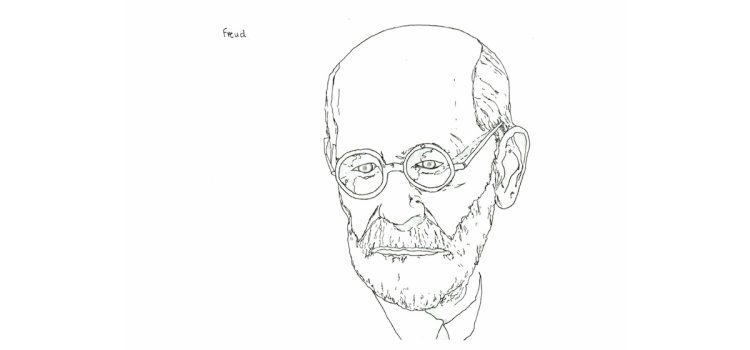
How much control do you truly have over your thoughts and actions? What happens when your unconscious mind influences decisions you believe you’re making consciously?
For Sigmund Freud, determinism was an inescapable reality. The concept seemed to fit well with his ideas about the unconscious mind. But, he also believed that we can gain some control over our lives through understanding the hidden influences of unconscious forces.
Keep reading to discover how the relationship between your conscious and unconscious mind might be more complex—and more fascinating—than you realize.
Image credit: Desconhecido / Núcleo Editorial (License)
Freud & Determinism
If our unconscious mind shapes so much of what we think and do, how much free will do we really have? This question troubled philosophers long before modern neuroscience emerged, and Freud’s attempt to answer it reveals a paradox at the heart of psychoanalysis. For Freud, determinism was a reality. This is the idea that our thoughts and behaviors are caused by unconscious forces beyond our control. Freud famously called free will an “illusion” and sought to expose how unconscious drives shape our actions. On the other hand, his therapeutic approach depended on the idea that we can use reason to understand and gain some control over these unconscious forces.
Freud resolved this tension by drawing on Kant’s idea of “rational autonomy,” the notion that our capacity to reason allows us to step back from our automatic reactions and make more deliberate choices. While we can’t eliminate unconscious influences, Freud believed that, if we work to understand them rationally, we can make more conscious choices about when to follow or resist our unconscious impulses. This philosophical framework helps explain why scientists such as Leonard Mlodinow (and David Eagleman in Incognito) emphasize that learning how our unconscious mind works can help us achieve a kind of freedom: not complete control over our unconscious processes, but the ability to engage with them more intentionally.
The question of whether we have free will is complicated by the fact that scientists and philosophers still aren’t sure how much of our thinking takes place outside of our conscious awareness. While modern neuroscience has confirmed that much of our mental processing happens unconsciously, researchers continue to debate where to draw the line between conscious and unconscious thought. Some, such as behavioral scientist Nick Chater (The Mind Is Flat), challenge traditional ideas about unconscious problem-solving. Chater contends that when we have an “aha moment” after stepping away from a difficult problem, this isn’t the result of unconscious processing working in the background, but rather our conscious mind approaching the problem differently when we return to it fresh.
Others, such as philosopher Peter Carruthers (The Opacity of Mind) take almost the opposite position: Carruthers argues that conscious thought is an illusion, and we only become aware of our thoughts after they’ve already occurred. These unresolved debates underlie the tension Mlodinow explores between our unconscious processing and our ability to consciously guide our thoughts and actions. While Mlodinow demonstrates throughout his book Subliminal that unconscious processes are more extensive than we typically realize, he approaches conscious and unconscious processing not as separate or competing systems, but as intertwined in ways we can work to understand—and see in action in our daily lives.
Questions for Reflection & Discussion
Think about the ways Freud and others attempt to explain determinism and free will, and apply these concepts to your own life.
- In what areas of your life do you feel your unconscious mind might be influencing your decisions without your awareness?
- How do you reconcile the idea of determinism with your personal sense of having free will?
- Mlodinow describes conscious and unconscious processing as “intertwined” rather than competing. How does this perspective change how you think about your own decision-making?
- What’s your reaction to Freud calling free will an “illusion”? Do you agree or disagree, and why?
- How might understanding your unconscious influences lead to greater freedom, as Mlodinow suggests?
- Can you recall a time when you had an “aha moment” after stepping away from a problem? How do you interpret that experience after reading about Nick Chater’s perspective?
- What practical steps could you take to become more aware of your unconscious thought patterns?
- How does Kant’s idea of “rational autonomy” apply to your everyday life? Can you think of examples where you’ve used reason to override automatic reactions?
- If Carruthers is right that “conscious thought is an illusion,” what implications might this have for personal responsibility?
- How does learning about the science of unconscious processing affect how you view yourself and others? Does it make you more or less compassionate?






